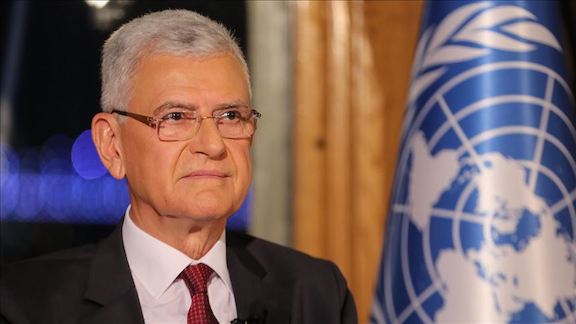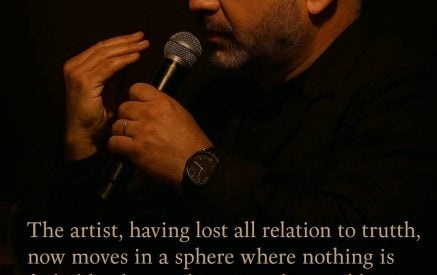By Harut Sassounian
Publisher, The California Courier
The General Assembly of the United Nations held a meeting on May 5, 2021 on the topic of “Interactive dialog to commemorate and promote The International Day of Multilateralism and Diplomacy for Peace.” The meeting is usually held on April 24, the date designated by the UN to celebrate “Multilateralism and Diplomacy for Peace.”
UN delegates from many countries, including the representative of Armenia, made remarks during the meeting chaired by the President of the General Assembly, Volkan Bozkir, a former Turkish diplomat, and UN Secretary General Antonio Guterres.
Davit Knyazyan, the Deputy Permanent Representative of the Armenian Mission to the UN in New York, made the following statement during the meeting:
Read also
“Armenia is firmly committed to effective multilateralism based on the purposes and principles of the Charter of the United Nations, including non-use of force or threat of force and peaceful resolution of disputes. April 24 is the day, when the Armenian people worldwide commemorate and pay tribute to the victims of the Armenian Genocide, which is a stark reminder that the crisis of international order can lead to atrocity crimes.
“The global challenges caused by the pandemic are a test to multilateralism. Amidst the growth of hate speech, weaponization of the pandemic to unleash wars and violate human rights and justification of past genocides, the United Nations should serve as the guardian of international law, purposes and principles of the UN Charter and values of humanity. Strengthening the capacities of the UN to prevent and respond to these challenges is crucial for upholding human rights and human dignity.
“We would like to ask the heads of the principal organs of the United Nations: what measures can be identified to strengthen the prevention mechanisms of the United Nations in order to address the rise of hate speech, denial and justification of past atrocity crimes? And second, how to ensure efficient response of the UN system to incitement of violence and identity-based crimes on ethnic and religious grounds?”
After brief remarks by the UN Secretary General, the President of the General Assembly, Volkan Bozkir, responded to the Armenian Representative’s statement:
“In reply to my distinguished colleague from Armenia [partly answered by the Secretary-General], Genocide is a crime specifically defined in the 1948 UN Convention on the Prevention and Punishment of the Crime of Genocide. What constitutes genocide and how that is determined are clearly established in the Convention. Accordingly, the crime of genocide needs to be determined by a competent judicial body. In other words, in order to describe an incident as genocide, a competent international tribunal must make a decision to that effect. The UN’s position on what constitutes genocide is naturally in line with the Convention, and it has been repeated many times by UN officials in the past, and, most recently, two weeks ago by the Spokesperson for the Secretary-General, who reiterated that genocide needs to be determined by an appropriate judicial body, as far as the UN is concerned.”
There are several problems with Mr. Bozkir’s statement. First of all, he responded to Armenia’s remarks more like a Turkish diplomat than as President of the General Assembly, in violation of the norms of his UN position. This is the reason that Armenia’s UN Ambassador Mher Margaryan submitted on May 10, 2021, a letter to the UN Secretary General, to be circulated as an official UN document, expressing concern that Mr. Bozkir was “misusing” the May 5 meeting to deliver “an irrelevant, unsolicited interpretation” of the Genocide Convention. Amb. Margaryan stated that Mr. Bozkir’s “misplaced remarks… must be seen in the context of the official politics of denying the occurrence of the genocide of the Armenian population in the Ottoman Empire consistently promoted by the government of Turkey, as demonstrated by the fact that Mr. Bozkir’s remarks came to be immediately publicized by the state-run news agencies of that country framed in support of the official denialist narrative. Clearly, Mr. Bozkir’s actions are incompatible with the Code of Ethics for the President of the General Assembly.”
Foreseeing Mr. Bozkir’s conflicting allegiances, the Permanent Representatives of Armenia and Cyprus at the UN, Mher Margaryan and Andreas Mavroyiannis, sent a joint letter on June 2, 2020, to the UN Secretary General objecting to Bozkir’s nomination to his current post.
The joint letter, circulated to all UN member states, reminded them that Mr. Bozkir had assured the UN: “(a) to represent solely the Office to which he is elected, based on the Charter of the United Nations and the body of resolutions, decisions, rules and practices that will bind him as President of the General Assembly; and (b) to treat all Member States equally, upholding the spirit of multilateralism and the rules-based international order, at the core of which is the United Nations.”
Ambassadors Margaryan and Mavroyiannis pointed out that Turkey, the country nominating Mr. Bozkir, “threatens peace and security in its entire region by consistently violating the Charter of the United Nations and international law, including United Nations sanctions regimes, in order to realize its aspirations for regional domination. It does so by displaying a pattern of aggressive behavior towards its neighboring countries, encroaching on their territory, undermining their sovereignty and territorial integrity, questioning their sovereign rights and instrumentalizing the plight of refugees and migrants for political ends. By imposing and sustaining an illegal land blockade on Armenia for almost three decades, Turkey effectively impedes the transit through and access to the sea of the neighboring landlocked country. Turkey’s persistent policies of denying and attacking the memory and the dignity of the victims of the genocide committed in the Ottoman Empire 105 years ago continue to pose a security threat for Armenia and the wider region. Turkey invaded Cyprus and has continued to occupy more than a third of its territory for almost 50 years; continues to deny its very existence by insisting on not recognizing it, having unilaterally proclaimed an illegal, secessionist entity in the area that it occupies, which it tries to oppose the sole legitimate Government, despite the clear condemnation of its actions by the Security Council; is responsible for egregious violations of human rights in Cyprus, which it continues to deny despite being condemned by the European Court of Human Rights; and continues to violate Cyprus’ sovereignty and sovereign rights on land, sea and air on a daily basis. It is for these reasons that our delegations object to the election of Mr. Bozkir by silence procedure and request that the election of the President of the General Assembly at its seventy-fifth session be held by secret ballot.”
Despite his UN position, Mr. Bozkir is acting as the representative of Turkey since he held numerous posts in his country’s Foreign Service since 1972, including Ambassador to Romania, Consul General in New York, First Secretary of the Embassy in Iraq, and Vice Consul General in Stuttgart, Germany. He also served as Chief of Cabinet and Chief Foreign Policy Advisor to Presidents Turgut Ozal and Suleyman Demirel, and Deputy Undersecretary at the Ministry of Foreign Affairs. He was also a member of the Turkish Parliament for nine years and Minister of EU Affairs.
Forgetting his commitments to the UN, Mr. Bozkir had a ‘Pavlovian’ response to the mention of the Armenian Genocide by Armenia’s representative. It is important to note that he has denied the Armenian Genocide several times while serving as a Turkish diplomat.
On May 5, 2021, Mr. Bozkir parroted the oft-repeated Turkish line that “the crime of genocide needs to be determined by a competent judicial body.” He was indirectly reacting to Pres. Biden’s recent acknowledgment of the Armenian Genocide. First of all, the Ottoman Empire (now Turkey) was the first country to hold court-martial trials regarding the Armenian massacres (the term genocide was not yet coined) in Istanbul, in 1919-1920, sentencing to death the masterminds of the Armenian mass killings. Secondly, Pres. Biden along with the US Congress and over 30 Parliaments around the world have acknowledged the Armenian Genocide, not as a legal judgment, but as a political affirmation of the crime of genocide.
By claiming that “genocide needs to be determined by an appropriate judicial body,” Mr. Bozkir is ignoring UN’s own records. For example, the UN War Crimes Commission prepared a lengthy report in 1948, accusing the Turkish Government of committing the Armenian massacres. The UN report described these massacres as “crimes against humanity,” which cover “inhumane acts committed by a government against its own subjects. Mr. Bozkir is also ignoring the fact that the UN Sub-commission on Prevention of Discrimination and Protection of Minorities adopted a report in 1985 in which the Armenian Genocide was mentioned as an example of genocide. I was present at that session and spoke in support of the UN report. Since the Genocide Convention was adopted by the UN, its acknowledgment of the Armenian Genocide is an authoritative statement.
Fortunately, Bozkir’s one-year term at the UN will be over in a few months. By acting as a spokesman for Turkey, he is trying to secure another Turkish diplomatic post as he will soon be out of his current job.



























































